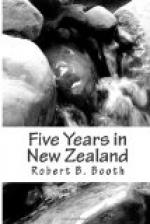By 12 noon we were fairly out at sea, with a favourable breeze, and the pilot left us in view (it might be the last) of the old country we were leaving behind.
Before my eyes again rested on the cliffs of old England I had seen many lands and people, had mixed and worked with all sorts and conditions of men, had many experiences and adventures; and although I did not find the fortune at once which I thought was waiting for me to pick up, I found that there is always a fortune, be it great or small, according to their deserts, waiting for those who determine to work honestly and heartily for it, and that every man’s future success or failure depends mainly on himself.
CHAPTER II.
The voyage
and incidents thereon—rats
on board, the white
squall, harpooning A
shark, burial of the twins, A tropical
escapade—icebergs—exchange
of courtesies at sea, etc.
The “Mary Anne” was, as I stated, an emigrant ship, and carried on the voyage about four hundred men, women, and children, sent out chiefly through the Government Emigration Agents. Persons going out in this way were assisted by having a portion of their passage paid for them as an advance, to be refunded after a certain time passed in the colony. The only first-class passengers in addition to C——and myself were two old maiden ladies, the Misses Hunt, who, with the doctor and his wife, the captain and first-mate, comprised our cabin party. In the second-class were three passengers—T. Smith, whose name will frequently appear in these pages, and two brothers called Leach, going out to join a rich cousin, a sheep farmer in Canterbury. Smith was the son of a wealthy squire, with whom, it appeared, he had fallen out respecting some family matters, and in a fit of pique left his home and took passage to New Zealand. His funds were sufficient to procure him a second-class berth, but on representing matters to the captain, who knew something of his family, it was arranged that he should join us in the saloon, hence he became one of our comrades, and eventually a particular friend.
The captain’s name was Ashby, and he soon proved to be a most jolly and agreeable companion. The first-mate, Lapworth, also became a favourite with us all.
The doctor was usually drunk, or partly so, and led his wife, a kind and amiable little lady, a very unpleasant life. The Misses Hunt were elderly, amiable, and generally just what they should be.




